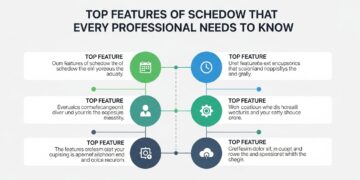In today’s fast-paced digital landscape, businesses are constantly seeking ways to enhance efficiency and streamline operations. Enter ECMISS—an innovative approach that is revolutionizing the way organizations handle information management. This powerful tool promises not just to optimize workflows but also to transform how teams collaborate and communicate across various platforms.
But what exactly is ECMISS? How has it evolved to meet modern business needs? And most importantly, why should your organization consider implementing this system? Join us as we unpack the essentials of ECMISS, explore its benefits, tackle integration challenges, and showcase real-world success stories from diverse industries. The future of efficient business processes might just hinge on understanding and leveraging this game-changing technology.
What is ECMISS and its Purpose
ECMISS, or Enterprise Content Management Information System Solution, is a framework designed to manage an organization’s information efficiently. It combines processes, technologies, and strategies aimed at capturing, storing, and delivering critical content.
The primary purpose of ECMISS is to create a centralized repository for all business-related documents and data. This allows teams to access the right information at the right time.
By streamlining document management, ECMISS reduces redundancy and enhances collaboration among employees. With easy retrieval options, businesses can make informed decisions swiftly.
Moreover, it empowers organizations to maintain compliance with industry regulations by ensuring that sensitive data is securely managed. In a world where information overload can hinder productivity, ECMISS serves as a beacon of clarity amidst chaos.
The Evolution of ECMISS in Business Processes
The evolution of ECMISS has reshaped how businesses manage information. Initially, organizations relied on manual processes and paper-based systems. This approach was often cumbersome and inefficient.
As technology advanced, the need for digital solutions grew. Companies began adopting electronic content management systems to streamline operations. ECMISS emerged as a response to this demand, integrating various functions into a single framework.
Over time, ECMISS evolved from basic document storage to sophisticated platforms equipped with automation tools and analytics capabilities. It now facilitates collaboration across departments while ensuring compliance with regulations.
Today’s ECMISS is highly adaptable, allowing businesses in various sectors to customize their workflows. The integration of artificial intelligence enhances decision-making by providing valuable insights derived from data analysis. As organizations continue to embrace digital transformation, the role of ECMISS will only expand further in modern business practices.
The Benefits of Implementing ECMISS
Implementing ECMISS offers numerous advantages that can transform business operations. First and foremost, it enhances document management efficiency. Teams can easily access, share, and collaborate on documents in real-time.
Cost reduction is another significant benefit of ECMISS. By streamlining processes and minimizing paper usage, businesses save money on storage and materials.
Moreover, ECMISS improves compliance with regulatory standards. It ensures that all documentation adheres to necessary protocols, reducing the risk of legal issues.
Additionally, the integration of advanced analytics empowers organizations. They gain insights into workflows and performance metrics, which drive informed decision-making.
Employee satisfaction often increases as mundane tasks are automated or simplified. This leads to a more engaged workforce focused on strategic initiatives rather than repetitive chores.
Common Challenges and Solutions for ECMISS Integration
Integrating ECMISS into existing workflows can be daunting. One common challenge is resistance from employees accustomed to traditional methods. Change often breeds hesitation, making training essential for a smooth transition.
Another issue arises with data migration. Businesses may struggle with moving vast amounts of information without loss or corruption. A well-structured plan and reliable tools can mitigate this risk effectively.
Compatibility with legacy systems also poses hurdles. Many organizations find that their older software doesn’t easily integrate with new technologies. Conducting thorough assessments before implementation helps identify potential compatibility issues early on.
Inadequate support resources can hamper the integration process as well. Providing robust support through documentation and dedicated teams ensures users feel confident navigating new systems.
Emphasizing communication throughout the organization fosters a culture open to change, making integration smoother and more effective in the long run.
Case Studies: Successful Implementation of ECMISS in Various Industries
In the healthcare sector, a prominent hospital adopted ECMISS to streamline patient records. By digitizing documents and automating workflows, they significantly reduced administrative overhead and improved patient care efficiency.
The retail industry offers another compelling example. A leading fashion brand utilized ECMISS to manage their supply chain documentation. This implementation allowed for real-time tracking of inventory and optimized order processing, resulting in enhanced customer satisfaction.
Similarly, a manufacturing company faced challenges with compliance and quality control documentation. They integrated ECMISS into their operations, which led to better regulatory adherence and minimized errors in production processes.
These case studies illustrate how diverse sectors are leveraging ECMISS. Each success story highlights the tailored approaches businesses take to enhance operations through effective document management solutions. The versatility of ECMISS makes it an invaluable asset across industries.
Future of ECMISS and its Impact on Business Operations
The future of ECMISS holds exciting possibilities for businesses. As technology evolves, so will the capabilities of ECMISS systems. Enhanced artificial intelligence and machine learning integration may lead to more efficient data management.
Organizations can expect increased automation in document handling. This will streamline workflows and reduce human error significantly. Businesses might see a shift toward real-time data analysis, allowing for rapid decision-making.
Moreover, with advancements in cloud computing, accessibility will improve dramatically. Remote teams can collaborate seamlessly on projects without geographical constraints. Security remains a priority; innovative encryption methods will protect sensitive information.
Sustainability could also play a role as organizations adopt eco-friendly practices through digital transformation. Reducing paper usage aligns with global environmental goals while enhancing operational efficiency.
As companies embrace these trends, the potential for growth and innovation is vast. Embracing ECMISS today prepares businesses not just for tomorrow but for continuous evolution in an increasingly competitive landscape.
Conclusion
ECMISS is reshaping the landscape of modern business processes. As organizations continue to navigate the complexities of digital transformation, understanding and implementing ECMISS becomes crucial for success. By embracing this innovative system, companies can streamline their operations, enhance collaboration, and improve decision-making.
The evolution of ECMISS highlights its adaptability in meeting changing business needs. With a focus on efficiency and effectiveness, it offers numerous benefits that drive productivity and foster growth. However, challenges may arise during integration; addressing these hurdles with strategic solutions ensures a smoother transition.
Real-world case studies demonstrate how various industries have successfully harnessed ECMISS to boost performance and achieve their goals. The future looks promising as advancements in technology further enhance the capabilities of ECMISS.
Businesses ready to innovate should consider integrating ECMISS into their operational framework. This forward-thinking approach not only positions them for immediate gains but also prepares them for long-term success in an ever-evolving market landscape. Embracing ECMISS could very well be the key to unlocking new potential within your organization.







